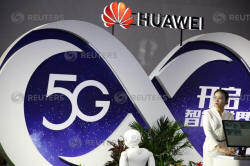|
Telecommunications services provider Spark New Zealand Ltd <SPK.NZ>,
which made the request, said on Wednesday it would review the
reasoning before considering any further steps.
The decision comes as Western nations become increasingly wary
of what they say is possible Chinese government involvement in
fifth-generation mobile and other communications networks.
Huawei has repeatedly insisted Beijing has no influence over it.
Earlier this year, neighbouring Australia banned Huawei from
supplying 5G equipment, also citing security risks. Last week,
the Wall Street Journal reported the U.S. government was trying
to persuade companies in allied countries to avoid Huawei.
"I have informed Spark that a significant network security risk
was identified," Government Communications Security Bureau
Director-General Andrew Hampton said separately on Wednesday.
Intelligence services minister Andrew Little told Reuters that
Spark - whose request was part of the country's first 5G
application - could work with the agency to mitigate risk. He
declined to specify the concerns, citing classified information.
Huawei said in a statement that it will "actively address any
concerns and work together to find a way forward", adding it has
signed more than 20 5G contracts with carriers worldwide.
Speaking in Beijing, Chinese Foreign Ministry spokesman Geng
Shuang expressed "serious concern", and said China-New Zealand
business ties were mutually beneficial and win-win.
"We hope the New Zealand government provides a fair competition
environment for Chinese companies operating in New Zealand, and
does more to benefit bilateral mutual trust and cooperation," he
told a daily news briefing.
TOTAL ACCESS
Huawei has been involved in other telecommunications systems in
New Zealand such as its 4G mobile network, and is investing
NZ$400 million ($271.88 million) into research and development.
Little said each decision regarding telecom technology was made
separately under telecom and security legislation.
"The difference between 5G networks and conventional 4G and 3G
networks is the configuration of the technology," Little said.
"With 5G technology, every component of the 5G network means
every part of the network can be accessed."
That echoed Australian concerns that, with 5G, it was difficult
to confine vendors considered high risk to a network's less
sensitive parts.
Spark rival 2degrees said it had noted the decision and was
"seeking clarity on it".
"The importance of multiple vendors to deliver price
competitiveness still stands, so if this announcement has a
similar impact on 2degrees it will be a real disappointment for
competition," 2degrees corporate affairs chief Mathew Bolland
told Reuters.
Vodafone New Zealand Ltd declined to comment on the matter.
($1 = 1.4712 New Zealand dollars)
(Reporting by Charlotte Greenfield in WELLINGTON and Aditya Soni
in BENGALURU; Additional reportng by Anne Marie Roantree in HONG
KONG and Ben Blanchard in BEIJING; Editing by Muralikumar
Anantharaman and Christopher Cushing)
[© 2018 Thomson Reuters. All rights
reserved.] Copyright 2018 Reuters. All rights reserved. This material may not be published,
broadcast, rewritten or redistributed.
Thompson Reuters is solely responsible for this content.
 |
|




